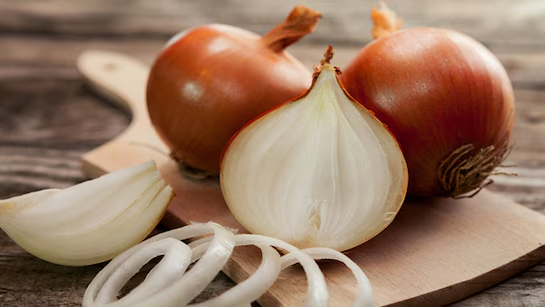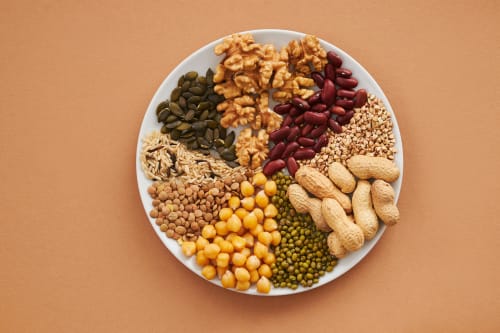How My Mom’s Onion Remedy Helped Me Overcome Chronic Constipation
Introduction
For as long as I can remember, my mornings as a middle schooler were fraught with frustration, anxiety, and a lot of discomfort. Missing the school bus became a regular occurrence, and the culprit was something I wasn’t even comfortable talking about at the time: chronic constipation. No amount of drinking water or eating fiber seemed to help. The medications prescribed by our family doctor swung the pendulum too far in the other direction, leaving me scared to leave the house for fear of soiling my pants. It was, to say the least, a nightmare.
After trying countless home remedies I found online and experiencing no significant relief, I reached a breaking point. One day, in tears, I begged my mom to take me to a better doctor. That’s when she remembered an old remedy her mother had taught her—a remedy involving onions. What unfolded next changed my life and gave me a deeper appreciation for traditional wisdom. But before I share this remedy, let me stress that everyone’s body is different, and the causes of constipation can vary widely. Always consult a healthcare professional to understand the root cause of your issue.
With that disclaimer out of the way, let me take you through my journey of frustration, discovery, and eventual relief—all thanks to the humble onion.
The Struggles of Chronic Constipation
Dealing with constipation as a middle schooler is more than just a physical issue; it’s deeply embarrassing. It felt like my mornings revolved around trying to do something as basic as passing stool. My stool was often hard, resembling small pebbles, which made the process both painful and time-consuming.
Here are some of the things I tried before turning to the onion remedy:
- Drinking More Water: Every article on the internet seemed to suggest that dehydration was the main culprit. I’d guzzle liters of water every day, but the results were negligible.
- Eating Fiber-Rich Foods: My mom filled my plate with fruits like papaya, guava, and bananas, as well as vegetables like spinach and carrots. I even tried psyllium husk, a popular fiber supplement. Yet, my stool remained stubbornly hard.
- Medications: Our family doctor prescribed laxatives, but these turned out to be more of a curse than a blessing. While they softened my stool, they made it so loose that I was constantly worried about accidents.
- Online Remedies: From drinking warm lemon water to consuming prunes, I tried every internet-recommended solution. None of them provided the relief I desperately needed.
The Turning Point: My Mom’s Forgotten Remedy
After one particularly difficult morning, I broke down and cried in front of my mom, pleading for a solution. That’s when she recalled an old remedy her mother used to swear by. She hesitated at first, as she hadn’t used it in years and wasn’t sure if it would still work. But given how desperate I was, she decided to give it a try.
The key ingredient? Onions. Big or small, red or white—any type of onion would work, as long as it was used the right way. She explained that the trick was not just in the ingredient but also in how it was prepared and administered. Intrigued and slightly skeptical, I agreed to give it a shot.
Why Onions? Understanding the Science
Before diving into the exact recipe, let’s take a moment to understand why onions might work as a remedy for constipation. Onions are rich in natural compounds that promote digestive health:
- Prebiotics: Onions are a great source of prebiotics, which nourish the good bacteria in your gut. A healthy gut microbiome is essential for smooth digestion and regular bowel movements.
- Fiber Content: While not extremely high in fiber, onions do contain enough to contribute to stool bulk and ease constipation.
- Sulfur Compounds: These compounds help stimulate the production of digestive enzymes, which can improve gut motility.
- Water Content: Onions have a high water content, which can help soften stool when consumed.
The Onion Remedy Recipe
Here’s the step-by-step process my mom followed to prepare the onion remedy:
Ingredients:
- 1 medium-sized onion (red or white, both work)
- 1 cup of water
- A pinch of rock salt (optional, for taste)
Method:
- Peel and chop the onion into small pieces.
- Boil the chopped onion in 1 cup of water for 5-7 minutes until the water changes color and the onion softens.
- Strain the mixture to remove the onion pieces, leaving only the onion-infused water.
- Let the water cool slightly, then add a pinch of rock salt if desired.
- Drink this onion water on an empty stomach first thing in the morning.

My Experience with the Remedy
The first time I tried this remedy, I was skeptical. The taste was tolerable but not exactly pleasant. However, within a few days of drinking onion water every morning, I noticed a significant difference. My stool became easier to pass, and the pain and strain I had become so accustomed to began to fade. Over the weeks that followed, I found myself spending less time in the bathroom and more time catching the school bus on time.
The best part? Unlike the medications I had tried before, this remedy didn’t have any side effects. It struck a perfect balance—neither too hard nor too soft—and gave me the relief I had been longing for.
Precautions and Considerations
While this remedy worked wonders for me, it’s important to keep a few things in mind:
- Consult a Doctor: Chronic constipation can have various underlying causes, such as hypothyroidism, irritable bowel syndrome, or dietary intolerances. It’s crucial to rule out any serious conditions.
- Allergies: Some people may be allergic to onions. If you experience any adverse reactions, discontinue use immediately.
- Consistency is Key: Natural remedies take time to show results. Don’t expect overnight miracles.
- Balanced Diet: While onion water can help, it’s not a substitute for a healthy diet rich in fruits, vegetables, and whole grains.
Part 2: Additional Tips and Lifestyle Changes
While the onion remedy worked wonders for me, it’s just one piece of the puzzle when it comes to managing and preventing constipation. Here are some additional strategies that complement the remedy and promote long-term digestive health:
1. Stay Physically Active
A sedentary lifestyle can slow down your digestive system, leading to constipation. Incorporate at least 30 minutes of physical activity into your daily routine. Activities like walking, yoga, or even light stretching can improve gut motility and make bowel movements easier.
Specific Yoga Poses for Constipation Relief:
- Pawanmuktasana (Wind-Relieving Pose)
- Malasana (Garland Pose)
- Ardha Matsyendrasana (Half Spinal Twist)
These poses help massage the abdominal organs and stimulate digestion.
2. Optimize Your Fiber Intake
While fiber didn’t initially work for me, I realized that the type of fiber matters. There are two types of fiber: soluble and insoluble. A balance of both is essential:
- Soluble Fiber: Found in oats, apples, and beans, this type of fiber absorbs water and forms a gel-like consistency, softening the stool.
- Insoluble Fiber: Found in whole grains, nuts, and vegetables, this type adds bulk to the stool and helps it pass more easily.
Aim for a mix of both in your diet.
3. Stay Hydrated
While water alone didn’t solve my constipation, it’s still a critical part of the equation. Dehydration can harden your stool and make it difficult to pass. Sip water throughout the day, and consider adding hydrating foods like cucumbers, watermelon, and citrus fruits to your diet.
4. Try Probiotics
A healthy gut microbiome is crucial for digestion. Incorporate probiotic-rich foods like yogurt, kefir, and fermented pickles into your diet. These can help balance gut bacteria and improve bowel regularity.
5. Establish a Routine
The human body thrives on routine. Try to wake up, eat meals, and go to bed at the same time every day. Additionally, train your body to have a bowel movement at a consistent time, preferably in the morning.
5. Establish a Routine
Our bodies love consistency. Setting a regular schedule for meals and bathroom visits can train your digestive system to operate like clockwork. For instance, waking up at the same time each morning and allotting a few minutes for bathroom time—even if you don’t immediately feel the urge—can encourage your body to establish a natural rhythm.
6. Avoid Overeating and Processed Foods
Processed foods, fast foods, and excessive sugar can slow down digestion, exacerbating constipation. Instead, prioritize whole foods like fresh fruits, vegetables, and whole grains. Eat smaller, more frequent meals throughout the day to reduce the burden on your digestive system.
7. Practice Stress Management
Stress can wreak havoc on your gut. High cortisol levels can disrupt digestion and lead to constipation. Practices like meditation, deep breathing, or even a simple 10-minute break to relax can help ease both your mind and your bowels.
8. Monitor Trigger Foods
Everyone’s digestive system is unique. Some people find that dairy, caffeine, or certain high-fat foods worsen their constipation. Keep a food diary to identify and avoid any specific triggers.
9. Herbal Teas and Natural Laxatives
While onion water was my savior, other natural remedies may work for you. Consider sipping on:
- Peppermint tea: Helps relax digestive muscles.
- Ginger tea: Stimulates digestion.
- Aloe vera juice: Acts as a mild natural laxative.
Always use these sparingly to avoid dependency.
10. Use Squatting Positions
Believe it or not, posture plays a role in bowel movements. Using a small stool to elevate your feet while on the toilet can simulate a squatting position, which is the natural posture for easier elimination.
11. When to Seek Medical Help
If constipation persists despite trying these remedies and lifestyle changes, it’s time to seek medical advice. Chronic constipation may indicate an underlying health issue such as hypothyroidism, irritable bowel syndrome (IBS), or even a structural problem in the digestive tract.
Conclusion: A Journey to Relief
Chronic constipation can be more than just a physical discomfort—it can affect your mental and emotional well-being. My journey taught me the importance of patience, persistence, and listening to both traditional wisdom and modern science.
The onion remedy may have been my personal breakthrough, but the key to lasting relief lies in holistic lifestyle changes. By combining natural remedies, dietary adjustments, and mindful habits, you can pave the way to a healthier and more comfortable life.
If you’re struggling with constipation, take heart: relief is possible, and it may come from the most unexpected places—like the onions sitting in your kitchen right now.
Disclaimer: This blog is based on personal experience and should not be taken as medical advice. Consult a healthcare professional for personalized guidance.
Here are some suggestions for external links you can incorporate into your blog for better SEO:
External Links for Science-Backed Information:
- Onion Health Benefits:
- Link to a reliable source discussing onion benefits, like Healthline’s article on onions:
https://www.healthline.com/nutrition/onion-benefits
- Link to a reliable source discussing onion benefits, like Healthline’s article on onions:
- Prebiotics and Gut Health:
- Include a link about prebiotics and their role in digestion from a trusted resource like the National Institute of Health (NIH):
https://www.ncbi.nlm.nih.gov/pmc/articles/PMC6627208/
- Include a link about prebiotics and their role in digestion from a trusted resource like the National Institute of Health (NIH):
- Fiber and Constipation:
- Link to a study or guide on how dietary fiber aids in constipation relief, like Mayo Clinic’s guide on fiber:
https://www.mayoclinic.org/healthy-lifestyle/nutrition-and-healthy-eating/in-depth/fiber/art-20043983
- Link to a study or guide on how dietary fiber aids in constipation relief, like Mayo Clinic’s guide on fiber:
Links for Yoga Poses and Physical Activity:
- Yoga for Digestion:
- Share a link to a step-by-step guide on yoga poses for constipation relief, such as Yoga Journal’s article:
https://www.yogajournal.com/poses/yoga-for-digestion
- Share a link to a step-by-step guide on yoga poses for constipation relief, such as Yoga Journal’s article:
Natural Remedies and Probiotics:
- Probiotics and Digestive Health:
- Link to a comprehensive guide on probiotics and their role in gut health from Harvard Health Publishing:
https://www.health.harvard.edu/staying-healthy/the-benefits-of-probiotics
- Link to a comprehensive guide on probiotics and their role in gut health from Harvard Health Publishing:
- Herbal Teas for Digestion:
- Suggest an external source like WebMD’s article on herbal teas:
https://www.webmd.com/diet/herbal-teas-for-digestion
- Suggest an external source like WebMD’s article on herbal teas:
Medical Advice and Constipation Causes:
- Understanding Chronic Constipation:
- Link to an authoritative medical resource like Cleveland Clinic’s overview on constipation:
https://my.clevelandclinic.org/health/diseases/4059-constipation
- Link to an authoritative medical resource like Cleveland Clinic’s overview on constipation:
- When to See a Doctor:
- Provide information on when constipation may require medical attention from Johns Hopkins Medicine:
https://www.hopkinsmedicine.org/health/conditions-and-diseases/constipation
- Provide information on when constipation may require medical attention from Johns Hopkins Medicine:











Leave a Reply